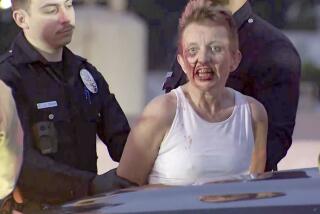Defense invokes ‘Crash,’ blaming chance encounter for man’s death
- Share via
In a city besotted with automobiles, John Osnes prided himself on doing without one. At 55, he had never owned a car and he never planned to. He loved the subway, the bus and most of all, walking.
But being a pedestrian in Los Angeles could be dangerous. Close calls with discourteous drivers grated on Osnes and he sometimes shouted at motorists who failed to yield to those on foot.
The rights of pedestrians were apparently on Osnes’ mind late one November night when an SUV pulled too close to him in a Hollywood crosswalk. What occurred next has been described by the driver’s lawyer as a real-life version of the Oscar-winning movie “Crash”: A random roadway encounter between strangers leads to tragedy.
Minutes after he stepped off the curb, Osnes lay dying, police were searching for the SUV’s driver, and 10 horrified witnesses were trying to understand how a minor confrontation -- a shout and a smack on a car hood -- had prompted an attack of breathtaking brutality.
“I was just screaming and trying to get out of the car,” a passenger in another vehicle, Rebecca Rinn, recalled on the witness stand last month. “I had never seen anyone hit like that before.”
A fuller picture of the encounter emerged in the last few weeks at a preliminary hearing in which a Superior Court judge ordered the driver of the SUV, Swedish musician David Jassy, held for trial on murder charges. The 35-year-old faces a possible life sentence in an attack that friends and acquaintances say they cannot reconcile with the man they knew.
He did not testify at the hearing, but witness accounts disclosed by the prosecution suggest that Jassy may have arrived at the intersection already riled by an argument with his girlfriend and then become enraged when Osnes struck the side and front of his rented vehicle.
“It’s just so senseless, so ridiculous,” Osnes’ friend and former partner Jim Crowley said.
Had Jassy and Osnes met under different circumstances they probably would have discovered much in common. The great passion in both their lives was music. Osnes had a day job at a travel agency, but he lived for the evenings, when he would play at piano bars in his Hollywood neighborhood. He was admired for his encyclopedic knowledge of standards and show tunes, the sensitive way he accompanied singers on the piano and his ironic sense of humor, according to friends.
Jassy was hoping to parlay his success in Sweden as a hip-hop writer and performer into a career in the U.S. and had been in Los Angeles for about a month at the time of the incident. Before his arrest, his most notable accomplishment here was rapping on a single by “High School Musical” actress Ashley Tisdale. In letters submitted to the court on his behalf, friends in the Swedish music industry called him a kind, hardworking musician who spent his free time singing in a gospel choir, playing soccer with his 11-year-old son and helping friends advance their recording careers.
Osnes had spent the evening of his death at a cabaret show with friends. He stopped at one of his favorite piano bars, The Spotlight, for a few drinks and then began a short walk to his apartment.
Meanwhile, Jassy was leaving a nightclub where he’d gone to listen to music and dance with a group of friends. According to one friend, Jassy and his girlfriend, Swedish model Therese Fischer, got into an argument after she accused him of looking at other women.
Fischer was in the passenger’s seat as the SUV pulled to the four-way stop where Selma Avenue crosses Schrader Boulevard. A passenger in a nearby vehicle said Jassy’s SUV rolled so far into the crosswalk that it almost struck Osnes. The pedestrian reacted by bringing his hands down on the hood of the SUV and shouting something, witnesses said.
Jassy immediately got out of the SUV and punched Osnes, witnesses testified. The blow knocked Osnes off balance and as he stooped -- either to regain his footing or to pick up his glasses -- Jassy kicked him in the face, the witnesses said.
“Like somebody punting a football,” motorist Rinn testified. “He stepped into it.”
The kick from the 6-foot, 200-pound Jassy lifted Osnes, who was 6-foot-3 and weighed about 160 pounds, off his feet, said R.J. Young, an off-duty Anaheim police officer who was in a car stopped at the intersection.
Another witness told police that Jassy shouted, “Stupid, why did you touch my car?”
Young said he thought he had witnessed “a possible homicide if not a felony assault” and ran toward Jassy, who was getting back into his SUV. The officer said he grabbed at the passenger door and slammed his badge against the window, shouting, “Police officer! Stop!”
He said Jassy looked at him, then put the vehicle into drive and turned its wheels in the direction of Osnes’ body. The officer testified that he was still holding on to the door when the SUV rolled over Osnes.
Inside the car, he said, Fischer “began screaming hysterically.” Young said he lost his grip on the door handle as Jassy accelerated down the street and through a red light. But he noted the license plate and Jassy was arrested later that day at his West Hollywood apartment.
By that time, Osnes had been pronounced dead. A coroner’s official testified that the kick or the resulting fall fractured Osnes’ skull and the force of the SUV broke his ribs and damaged his liver when it ran over him. Either set of injuries would have been fatal, the pathologist said.
In court, Jassy bears little resemblance to the rapper who wore a tough stare and a hoodie on his MySpace page, which was taken down after the incident. Held on $1-million bond since his arrest, he looks pale and thin in his jail uniform. The handful of friends who come to support him at hearings no longer includes Fischer, whose profile on a modeling website indicates she now lives in London.
Jassy’s lawyer, Donald Etra, has said his client is “devastated” by the death of Osnes, whom he called “a very good man.” The lawyer has implied Jassy is open to a plea deal.
“If an early and fair resolution could be achieved, he would certainly consider it,” Etra said.
At the preliminary hearing, the attorney said the facts of the case fit manslaughter rather than murder. Etra suggested Osnes bore some responsibility for what he called “a fight” and objected to the use of the term “victim.” He noted that Osnes’ blood-alcohol level was 0.10%, above the legal limit for driving, and implied that Jassy may have felt threatened by Osnes and later by Young.
In court papers, the lawyer wrote that Osnes’ death fit the thesis of the film “Crash” -- “that random interactions of diverse people in a city as frenetic as Los Angeles can lead to disastrous consequences.” He said the case begged a series of “what ifs,” starting with, “What would have happened if Mr. Jassy and Mr. Osnes had not arrived on the same corner at the same time?”
The prosecutor, Sarika Kapoor, shot back: “The only ‘what if’ we are left with is: What if the defendant valued human life?”
Judge Darrell Mavis declined to reduce the charge to manslaughter.
Osnes’ sister, Kris, bristled at the allusions to “Crash,” which she said amounted to arguing that Jassy was “a victim of circumstance” and “the devil, the city of Los Angeles, made him do it.”
“Framing it in this way does, on some level perhaps, distance, or even soften, what actually transpired,” she wrote in an e-mail.
But while “actors get up and walk away after the cameras quit rolling,” she wrote, her brother “never got up and walked away.”
--
More to Read
Sign up for Essential California
The most important California stories and recommendations in your inbox every morning.
You may occasionally receive promotional content from the Los Angeles Times.










